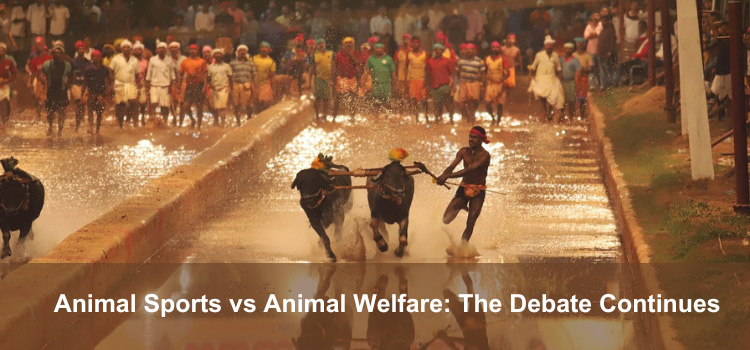Animal Sports v. Animal Welfare: The Debate Continues
Posted On : July 11, 2023

Table of Contents
Are Animals Legal Persons?
For animals to hold any rights, they ought to be a legal person. What and who possesses legal personhood is another age-old debate that continues. If we consider the simplest definition, any entity that can possess rights and duties can be a legal person. If we were to assign legal personality to animals, they thus have to perform duties and can possess rights.
Animals are not legal persons. The basic reason for the same stems from the fact that they cannot perform any duties or even be aware of the rights that they possess. For example, a cow cannot be dragged to court for trespassing one’s land. Thus, the laws passed regarding animals do not give them rights because they are legal persons under the law.
How are Laws Protecting Welfare of Animals Passed?
One may then wonder how laws protecting the welfare of animals passed. These laws are enacted to protect the human interests that vest in animals. Human beings are legal persons under the law. While animals are not, they are still cared for dearly by humans. The latter believes that animals should not be tortured unnecessarily. It goes against the wishes of the humans and thus, animals are protected by laws enacted by humans.
Who has the Authority to Pass Legislations on the Behalf of Animals
The matter of animal protection has been allotted to both the State List and the Concurrent List of the Constitution.
In the State List, Item 14 establishes that the States have the power to “preserve, protect and improve stock and prevent animal diseases and enforce veterinary training and practice.”
In the Concurrent List, which contains matters on which both the State and the Centre can take decisions upon, it states:
1. Item 17: “Prevention of cruelty to animals.”
2. Item 17B: “Protection of wild animals and birds.”
Therefore, both the State governments and the Central government can pass legislation regarding animal welfare.
Legislations in India
1. Prevention of Cruelty to Animals Act, 1960 – One of the most important legislations with respect to animal laws enacted by the Centre. The Animal Welfare Board of India (AWBI) was also established under this Act.
2. Wildlife Protection Act, 1972 enacted by the Centre.
3. Legislations regarding prohibition of cow slaughter and protection of cattle at the State levels.
4. The Indian Penal Code, 1860 - Section 428 and 429
Section 428 – Mischief by killing or maiming animal of the value of ten rupees — Whoever commits mischief by killing, poisoning, maiming or rendering useless any animal or animals of the value of ten rupees or upwards, shall be punished with imprisonment of either description for a term which may extend to two years, or with fine, or with both.[1]
Section 429 – Mischief by killing or maiming cattle, etc., of any value or any animal of the value of fifty rupees — Whoever commits mischief by killing, poisoning, maiming or rendering useless, any elephant, camel, horse, mule, buffalo, bull, cow or ox, whatever may be the value thereof, or any other animal of the value of fifty rupees or upwards, shall be punished with imprisonment of either description for a term which may extend to five years, or with fine, or with both.[2]
5. Article 21 of the Indian Constitution – Most of the rights of animals are claimed under the ambit of this fundamental right to life and personal liberty even though animals are not legal persons.[3]
6. Article 48A of the Indian Constitution – As a constitutional duty, animal protection is augmented by this DPSP.[4]
History of Animal Sports in India
When we involve animals in sports for our entertainment, are humans and animals in an employer-employee relation? Neither Labour Law nor Civil Law has yet drawn the legal consequences of the existence of labour relations that unite animals and man.[5] There have been many sports that are controversial with respect to animal welfare in India. A few of them include Jallikattu, cockfight, Kambala, bear dance, monkey dance and so on.
The debate is always the same as mentioned above. One group says that the animals are being unnecessarily tortured for the entertainment of humans. The other group claims these sports have been a part of our culture since ages and the animals are bring cared for dearly throughout the year. They are even considered a part of one’s family.
In the recent past, the sport in the spotlight is Jallikattu. It is a sport that involves taming of bulls during the festival of Pongal in the southern state of Tamil Nadu. This is a sport that has been practiced by the people of that region for almost 2500 years. A cave painting that shows a person trying to tame a bull serves as evidence for the same.
Landmark Judgements
The sport of Jallikattu became a controversy when one of the animal welfare organizations by the name People for the Ethical Treatment of Animals (PETA) filed a case against this practice of Jallikattu claiming that the animals are being tortured unnecessarily. They contended that the bulls are provoked and are forced to run in fear. They also suffer fatal injuries every year.
Thus, the ban of Jallikattu has been on and off since 2006. The timeline goes as follows:
1. In 2006, it was banned after the death of a person who participated in the sport.
2. In 2009, the Tamil Nadu government passed the Tamil Nadu Regulation of Jallikattu Act, 2009 removing the ban.
3. In 2011, the AWBI and PETA filed a petition (Animal Welfare Board of India v. A.Nagaraja And Ors.[6]) arguing that Jallikattu is in contradiction to the Prevention of Cruelty to Animals Act, 1960.
4. In 2014, the 2009 legislation by the Tamil Nadu government was struck down.
5. 2016 was the year of State elections in Tamil Nadu and it was no surprise that the environment ministry revoked the ban by issuing a notification.
Recent Updates
The validity of such legislations by the State governments in favour of such sports were questioned. On the 18th of May 2023, the Supreme Court through a Constitution Bench, upheld such legislations and dismissed the petitions questioning the validity of the same. The amendments already had the assent of the President. The one question that the court refused to answer was whether Jallikattu was an integral part of the Tamil culture. The apex court voiced that it will not go against the view of the State legislature which held that it was indeed a part of their culture.
[1] Indian Penal Code, 1860, §428
[2] Indian Penal Code, 1860, §429
[3] INDIA CONST. art. 21
[4] INDIA CONST. art. 48A
[5] Lercier, M., Welfare Protection of the Animal-Athlete in the Sports Company in Light of the Evolution of the Legal Regime for Animals, Derecho Animal (Forum of Animal Law Studies) 10/1 (2019)
[6] [(2014) 7 SCC 547]





















